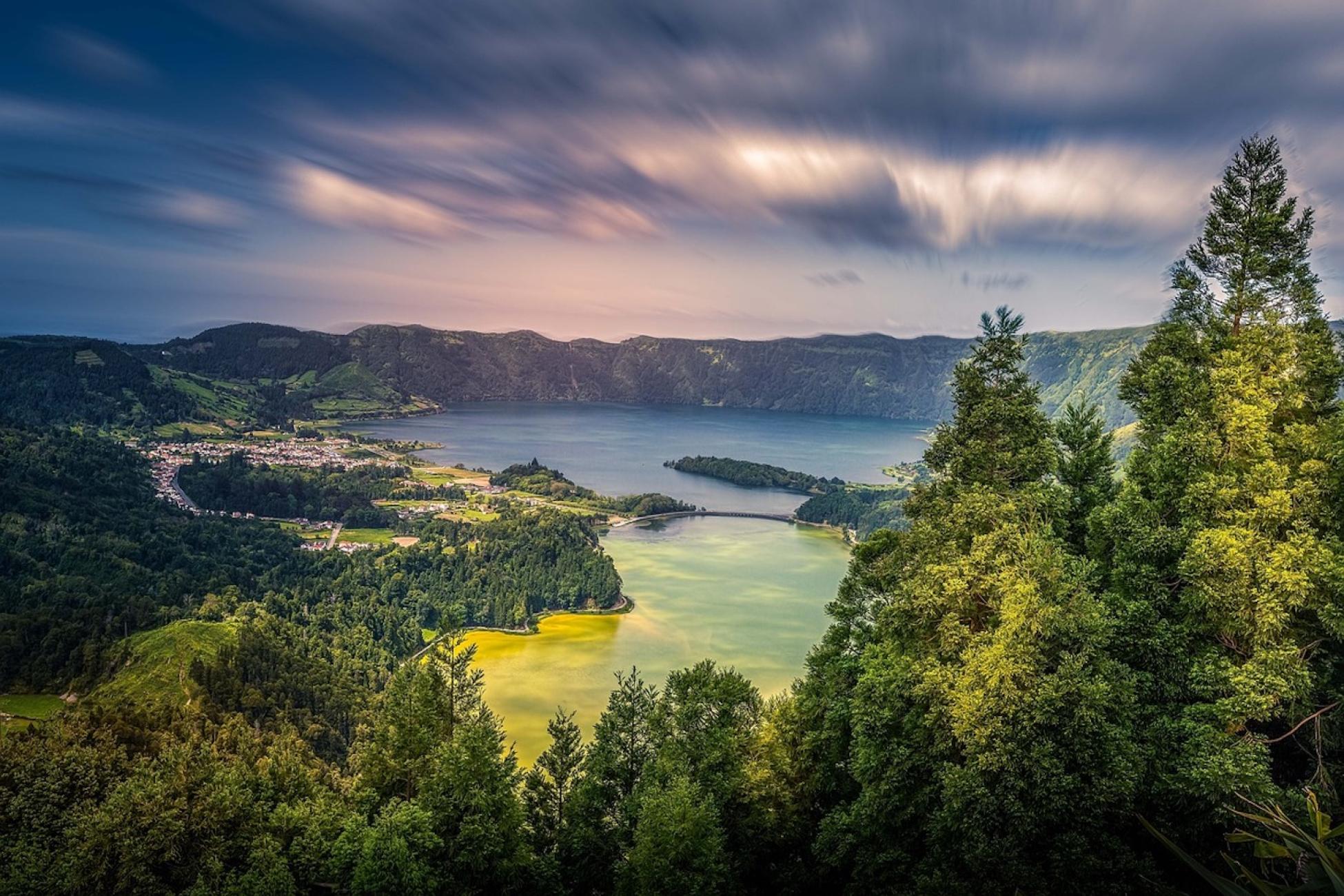If you take a taxi from São Miguel’s airport, you may be offered to go on a full tour of the island. If you do embark on the improvised trip, the taxi driver will turn into an experienced storyteller, telling you all about the legends of Sete Cidades’ lakes and the national heroine Brianda Pereira—the woman who defeated the Spanish Armada with an army of cattle.
I didn’t get to hear the stories in the backseats of a cab—piercing through the clouds that surround Sete Cidades—but I did some asking around the town while on a visit to the iconic lakes. As expected, I was promptly rewarded.
The first story goes as follows:
The princess of the kingdom of Sete Cidades—a young and beautiful blue-eyed girl named Antília—fell in love with a green-eyed shepherd. The two met in secret during the princess' daily walks; the only time she was allowed to leave the castle's walls. As her father, the king, learned about their relationship, he forbade the two to see each other again. The princess, devastated, begged him to see the shepherd one last time, to which the king, moved by his daughter's grief, finally agreed. The two cried in each other’s arms over their lost love, as their tears ran down the valley. The princess’ tears formed a blue lake, while the shepherd’s tears a green one, giving to Sete Cidades its colourful lakes.
I love the simplicity of this story; it’s heart-warming, and a very effective way to dodge specific questions about the lakes.
An Azorean icon: Brianda Pereira
The tale concerning Brianda Pereira is another classic of the islands, a mix of historical recount and beautiful exaggeration:
During the 1581 Spanish invasion of Terceria, Brianda Pereira was taken prisoner with her family. After seeing her house and all her possessions set on fire by the Spanish, Brianda managed to escape, starting her run to save her family, her crops and her nation. She encouraged the people of the island to fight back, arming all the women of Terceria and leading them onto the battlefield. Still outnumbered, they decided to use the greatest resource of the island: the cattle.
Bulls and cows were released against the Spanish soldiers, who unable to deal with the unusual army fell under the weight of Terceria’s cattle. Decimated, the Spanish armada was forced to retreat and sailed back to the mainland with dishonour.
Brianda Pereira became the icon of the Azorean resistance, depicted in books and plays as the heroine that defeated the Spanish, opening the way to the liberation of all Portugal.
The line between history and myth here is blurred at best, which in my view is the best part of it. There’s just something about a group of untrained women defeating the most powerful army in the world with a herd of cows that is simply fantastic. Personally, I choose to believe.
The lost city of Atlantis
After learning about Brianda I was completely hooked on the Azorean folklore—I needed to know more. A trip to the island’s public library revealed an endless catalogue of popular beliefs and legends. From the whaling tales of great adventures at sea, inspired by the booming whaling industry in the 20th century, to the Greek myths of paradise-like islands at the border of all the known world, the Azores are caught in the middle of countless stories.
A trip to the island’s library revealed an endless catalogue of popular beliefs and legends.
Among these is the myth of Atlantis, which has been around for an astonishing amount of time to the point of becoming essentially ingrained in the very Western culture.
Stories regarding mythical islands have appeared in ancient Greek mythology since the times of Homer. The writer called them the Fortunate Isles; an earthly paradise for heroes and gods located somewhere outside the men’s world, deep in the Atlantic. In Plato's work Timaeus and Critias, the islands reduced to one and took the name of Atlantis. The story was most likely to be intended as an allegory, but time and different cultures made of Atlantis a whole legend on its own.
The island of Atlantis is described as a strong and prosperous naval empire that—regardless of its already-vast reach and wealth—attempted to conquer Athens, attracting the rage of the gods upon itself. Decided to punish its greed, the Greek gods sank the island deep into the ocean, destroying the powerful empire of Atlantis. The story has become enormously popular over the years, leading to all kind of speculations about its real location. One of these sees the Azores as all that is left of Atlantis, claiming that the volcanic islands are just the tip of the legendary empire.
The more stories I added to my personal collection, the more I became fascinated with the islands.
What’s real and what’s mere speculation is not really important to me. Tales, just like language and food, are part of culture, a tiny piece of knowledge that helps you understand a bit better what’s around you. It’s stories that spark my interest, not their veracity. And I believe this is why some of these tales have been around for centuries.
Does it really matter if Brianda Pereira was the one sending the cattle against the Spanish, or if Sete Cidades ever was a kingdom? Stories capture peoples' imagination, speaking truth without necessarily being true; they function as an invisible bond that links entire nations together.
Learning about the Azores’ tales made me feel somehow closer to the place, as if I was now sharing a secret with the rest of the islands.
Add this article to your reading list





